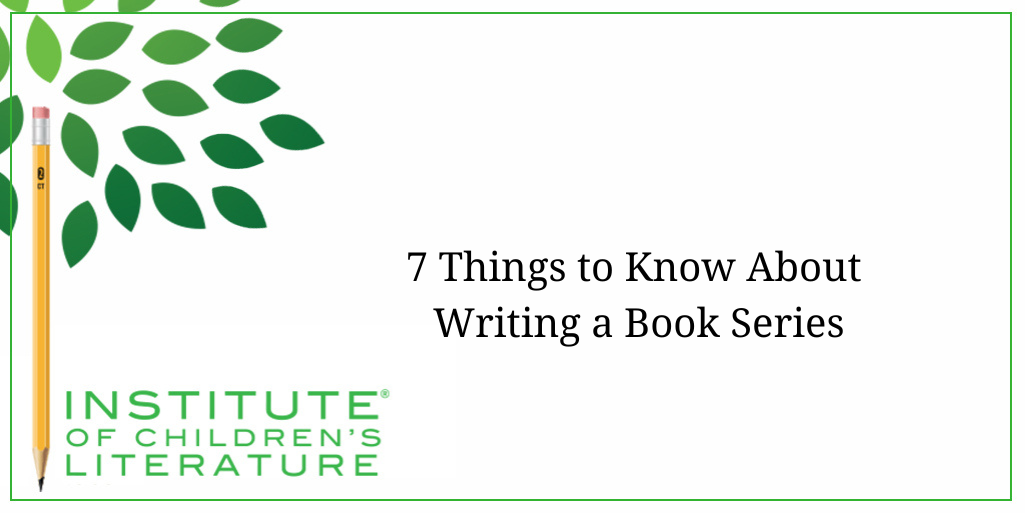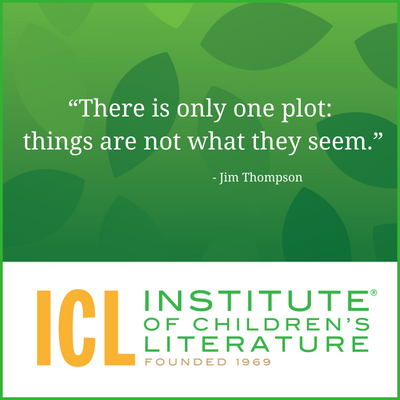
5 Ways Writers Can Prep for 2025 Goal Setting
Before we roll on to the new writing year, let’s harness our optimism for the blank slate before us and prepare for our 2025 Goal Setting just for writers.

We teach our students how to write and get published!
View our Course Catalog >
One of the most interesting things about book genres is the potential for writing a book series. Many writers are nervous about writing a book series, especially since we’re often steered away from them. But there is good news when we look at books that sell very, very well.

Among acceptance trends on the publisher side, stories told by authors from within the group (especially underrepresented groups) are still sought out. In picture books, #ownstories are equally valued along with character portrayals that challenge traditional genre roles and stories that explore big feelings and social or psychological issues written by authors with direct experience with these themes. Stories about the environment and our responsibility to it are also on trend right now. One element is unchanging: over-the-top, unexpected characters that children can fall in love with are always popular.
Let’s zero in on one segment of the buying trends: series books. For many years the popular wisdom has been to focus on writing a single book with the recognition that if it goes over well with readers, you might get to turn it into a series. This is still true, but it’s not the total story. Many publishers are interested in books that show strong series potential right from the beginning. Also, with the huge sales figures in middle grade books, publishers are more interested than ever in books for this age group, especially books that offer series potential.
An interest in series is especially true for educational publishers. For example, Kane Press is only accepting proposals for book series. Educational publishers often release a whole set of books in a series at one time so when they buy a series, they want it all. Commercial publishers are considerably more hesitant, but that doesn’t mean they don’t want book series. In fact, they’re nervously eager. They just have to get that tempting first book before they commit to a series.
If you’re a writer who really wants your book to be the first in a series, how do you best go about that? For one, you need a premise that is big enough to carry a series. For instance, suppose your book is about a boy who struggles with the fact that his grandfather with Alzheimer’s is living with the family. And at the end of the book, the boy’s grandfather has died, but not before they had some special moments and the boy has grown and changed through the experience. This kind of premise is so completely contained that it might be hard to visualize as a series unless the reading world simply fell in love with this young character and clamored for more about him. That’s not likely to happen. This book may be a compelling and much-loved single title, but it’s not the sort of book that would suggest possible future stories.
A larger premise can offer a well of possibilities. For instance, suppose you write a book about a girl whose family moves to a small community where everyone works for the same high-tech company. But the town turns out to be really strange, filled with odd people and experiences. Everything about this new place seems a little “off.” Now, the story in the book you’re writing could be about how this girl comes to the conclusion that one very odd person in town is actually an alien, and she begins watching him only to ultimately discover he’s not an alien, he’s a corporate spy selling secrets from the high-tech company. The girl’s wild flights of imagination had her come to the wrong conclusion early, but her efforts still resulted in something great. So it’s a solid first book but she’s still in a weird town full of people all working for a very secretive company—so all kinds of interesting possibilities for future stories set in this town abound.
There’s a reason why so many series books are genre specific. Genre offers more potential for high-concept stories with unique possibilities. You’ll see piles of fantasy series or adventure series (especially with high-tech/science fiction elements). Dystopian series wax and wane but never totally disappear. Dystopian isn’t the hot thing right now, but it’s still alive, no doubt about it. Historical series with elements of other genres mixed in still pop up every season as well as alternate history books. In alternate histories, writers examine what the world might be like if steam was still a major driver of technology or what the world might be like if huge conflicts went a different way. It’s easy to see how these types of genres lend themselves so easily to writing a book series. That’s the reason these high-concept genres are so prolific in series books because they offer huge opportunities for new stories told in the same world as the first book. The premise is always grand and roomy, which means more and more books can add on to a series without feeling the strain.
Sometimes a high-concept series doesn’t always “star” the same main character. A series where the main premise is a town full of weird geniuses might have a different main character every time. Or a scary series whose first book is about a team that accidentally releases monsters into the world could have different books with different characters dealing with the new world of monsters.
Some books, especially for upper middle grade readers and teens are part of very short series. Trilogies, for example, pop up often in these very short series. Most short series were intended to be trilogies right from the beginning. In fact, sometimes the books are serials where the plot of the first book continues into the second and the third, with each book feeling very much like a broken piece of a single whole. This kind of serial only works for older readers who have the patience to return to an unfinished story when the next piece comes out. That kind of structure is too confusing and frustrating for kids below tween age (and relatively rare for kids younger than teens).
A big premise is not the only thing a strong book series needs. Another is a compelling, flawed but relatable main character. Basically, a series will struggle to survive with a weak main character, so you really need to bring the main character to life and make readers believe in this person. For example, Harry Potter was a great series lead. He was deeply flawed (and sometimes a little overly given to whining) but he was also totally inexperienced in the weird world the author was going to throw him into. Since Harry had no pre-knowledge of this weird new world, he could bring the reader into it, because he and the reader were discovering this new world at the same time. It was this use of an inexperienced character that helped so many young readers believe so completely in the whole wizard world. Harry also had strong supporting characters (some far stronger and more compelling than Harry, in fact) who helped readers through the frustration of Harry’s flaws.
Some series books use huge over-the-top characters. For example, in the hugely popular Diary of a Wimpy Kid series, Greg is another deeply flawed character. In fact, he’s often not particularly likable. But he is relatable and extremely funny. Greg isn’t just a little clumsy and he doesn’t suffer from a little bad luck; the kid is a walking disaster, which is what leads to much of the humor in the series. He is also self-deprecating, which helps readers admire this difficult kid.
One excellent way to look at writing a book series is to check out the first book in a pile of different series. Read each book and create a character sketch for the main character in every book. Look for things the main characters have in common. Ask yourself what elements of this character are essential for the series’ success. You might even read a couple of books in the series and look at how the main character changes, or whether the character changes at all. (In picture book series, for example, sometimes the main characters don’t change much. This is because young children love predictability. So, if you can count on the pigeon to be stubborn and self-centered in every book, even when he’s not trying to drive the bus, that only adds to the appeal of the series.)
As you study main characters in different series books, you’ll be teaching yourself what kinds of things you’ll want and need for your own series character. There really are few easier or more enjoyable ways to learn than through the osmosis of reading. So, if you have a heart for writing a book series, pick a genre, gather some series books, and start your study. You’ll be glad you did.
With over 100 books in publication, Jan Fields writes both chapter books for children and mystery novels for adults. She’s also known for a variety of experiences teaching writing, from one session SCBWI events to lengthier Highlights Foundation workshops to these blog posts for the Institute of Children’s Literature. As a former ICL instructor, Jan enjoys equipping writers for success in whatever way she can.

Before we roll on to the new writing year, let’s harness our optimism for the blank slate before us and prepare for our 2025 Goal Setting just for writers.

Writers can be thin-skinned when it comes to getting feedback on their work. Let’s look at 4 ways to positively deal with constructive criticism!

Rejection is part of the territory when it comes to being a writer. Today we offer reflection for writers to help redirect your efforts after a rejection.
1000 N. West Street #1200, Wilmington, DE 19801
© 2024 Direct Learning Systems, Inc. All rights reserved.
1000 N. West Street #1200, Wilmington, DE 19801
© 2024 Direct Learning Systems, Inc. All rights reserved.
1000 N. West Street #1200, Wilmington, DE 19801
© 2024 Direct Learning Systems, Inc. All rights reserved.
1000 N. West Street #1200, Wilmington, DE 19801
© 2025 Direct Learning Systems, Inc. All rights reserved.
1000 N. West Street #1200, Wilmington, DE 19801
©2025 Direct Learning Systems, Inc. All rights reserved. Privacy Policy.
2 Comments